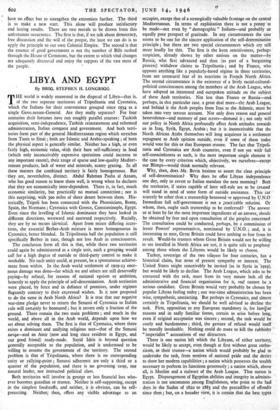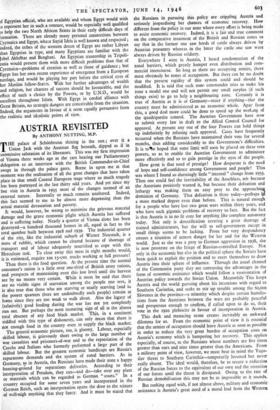LIBYA AND EGYPT
By BRIG. STEPHEN H. LONGRIGG
THE world is widely interested in the disposal of Libya—that is. of the two separate territories of Tripolitania and Cyrenaica, which the Italians for their convenience grouped since 1934 as a single Governorate-General. Are they really separate? For four centuries their fortunes have run roughly parallel courses: Turkish acquisition, semi-independence, Turkish reinstatement and reformed administration, Italian conquest and government. And both terri- tories form part of the general Mediterranean region which stretches from Tunis to Sinai ; both .are Islamic and Arabic-speaking ; of both the physical aspect is generally similar. Neither has a high, or even - fairly high, economic value, with their hare self-sufficiency in, food (which only inconceivably expensive operations could increase to any important extent), their, range of sparse and low-quality Mediter- ranean products, lack of water and minerals, scanty grazing. In all these matters the combined territory is fairly homogeneous. But -they are, nevertheless, distinct. Abdul Rahman Pasha al Azzam, who has good reason to know them well, is wrong when he declares that they are economically inter-dependent. There is, in fact, much economic similarity, but practically no mutual connection ; nor is this surprising, with 300 miles of sheer desert between them. His- torically, Tripoli has been connected with the Phoenicians, Rome, Spain, the Normans ; Cyrenaica with Greece, Constantinople, Egypt. Even since the levelling of Islamic dominance they have looked in different directions, westward and eastward respectively. Racially, they are by no means identical. Apart from minor differing iccre- Lions, the essential Berber-Arab mixture is more homogeneous in Cyrenaica, better blended. In Tripolitania half the population is still specifically Berber in race, though not less Arab in consciousness. The conclusion from all this is that, while these two territories could again be administered as a single unit, such a grouping would call for a high degree of outside or third-party control to make it workable. No such unity could, at present, be a spontaneous achieve- ment from within. In the Arab world settlement of 1919-23 enor- mous damage was done—for which we and others are still deservedly paying—by refusal, for reasons of national egoism or ambition, honestly to apply the principle of self-determination. Arab territories were placed, by force and in defiance of promises, under regimes flagrantly contrary to their expressed wishes. Is it now proposed to do the same in Arab North Africa? It is true that our negative war-time pledge never to return the Senussi of Cyrenaica to Italian rule will certainly be honoured ; but it covers only a fraction of the ground. There remain the two main problems ; and much in the world, and above all in the .Arab world, depends upon how we set about solving them. The first is that of Cyrenaica, where there exists a dominant and unifying religious sect—that of the Senussi toriqa—and an Amir (now and long since resident in Egypt, and our good friend) ready-made. Sayid Idris is beyond question generally acceptable to the population, and is understood to be willing to assume the government of the 'territory. The second problem is that of Tripolitania, where there is no corresponding unity or rallying-point ; Senussi adherents are only a third or a quarter of the population, and there is no governing caste, nor natural leader, nor instructed. political class.
Both territories will involve in greater or less financial loss who- ever becomes guardian or trustee. Neither is self-supporting, except in the simplest foodstuffs, and neither, it is obvious, can be self- protecting. Neither; then, offers any visible advtanage to an occupier, except that of a strategically valuable frontage on the central Mediterranean. In terms of exploitation there is not a penny to be made—not even by " demographic " Italians—and probably an equally poor prospect of gratitude. In any circumstances the case seems to be one for the sincere application of the self-determination principle ; but there are two special circumstances which cry still more loudly for this. The first is the keen sensitiveness, perhaps suspicion, already shown by other nations on the matter—by Russia, who first advanced and then (as part of a bargaining process) withdrew claims to Tripolitania ; and by France, who opposes anything like a popularly-based regime in these territories, from not unnatural fear of its reactions in French North Africa. The second circumstance is the existence of a lively racial-cultural- political consciousness among the members of the Arab League, who have adopted an interested and outspoken attitude on the subject of these Arab territories. Not less than France or Russia--a. ncl perhaps, in this particular case, a great deal more—the Arab- League, and behind it the Arab peoples from Iran to the. Atlantic, must be taken into very serious account. Not only does reason and general benevolence—and- memory of past eirors—demand it ; not only will our policy in North Africa profoundly affect Arab attitudes towards us in Iraq, Syria, Egypt, Arabia ; but it is inconceivable that the North African Arabs themselves will long acquiesce in a settlement repugnant to Arab ' opinion outside, even if some of them today would vote for this or that European trustee. The fact that Tripoli- tania and Cyrenaica are Arab countries, even if not yet with' 'full self-consciousness- as such, is the most important single elenient it the case by every criterion which, objectively, we ourselves—except our Blimps—would think normally relevant. • Why, then, does -Mr. Bevin hesitate to assert the clear principle of self-determination? Why does he offer Libyan independence one day, only to revert to Italian mandate the next morning? • Both the territories, if estates capable of later self-rule are to be Created will stand in need of some form of outside assistance. This car scarcely be other than a trusteeship bestowed or approved by .U.N.0 - Immediate full self-government is - not a practicable solution: Or whom, then, ought such trusteeship to be conferred? The answer, or at least by far the most important ingredients of an answer, shook be obtained' by free and open consultation of the peoples-concerned The consultation could be conducted, perhaps, by a commission of lesser Powers' representatives, nominated by .U.N.O. ; and, it is interesting to note, Great Britain could have nothing to fear from its result. Would-be trustees whom Great Britain would not be willing to see installed in North Africa are not, it -is quite safe to prophesy among those whom the Libyans would be likely to choose.
Turkey, sovereign of the two vilayets for four centuries, has a historical claim, but none of present sympathy or interest. The United States might conceivably be invited (as in Syria in 19I9), but would be likely to decline. The Arab League, which asks to be entrusted with the task, must from its very nature lack all the administrative and financial organisation for it, and cannot be .a serious candidate. Great Britain would very probably be chosen by popular Libyan feeling today ; our war-time administration has been wise, sympathetic, unexacting. But perhaps in Cyrenaica, and almost certainly in Tripolitania, ive should be well advised to decline the ' task. First, opposition to any European mandatory is,- for familiar reasons and in sadly familiar forms, certain to arise before long, even if original acceptance was sincere ; second, the task would be costly and burdensome ; third, the gesture of refusal would itself be morally invaluable. Nothing could do more to kill the rubbishy " imperialist " accusations of our detractors. - There is one nation left which the Libyans, of either territory; would be likely to accept; even though at first without great enthu- siastn, as their trustee=a nation which would probably be glad to undertake the task, from motives oLnational pride and the desire to show her modern capabilities; a nation which possesses the wealth necessary to perform its functions generously ; a nation which, above all, is Muslim and a stalwart of the Arab League. That nation is Egypt. Disparagement of Egyptian abilities and integrity in adminis- tration is not uncommon ,among Englishmen, who point to the bad days in the Sudan of 1820 to 1883 and the peccadillos of effendis since then ; but, on a broader view, it is certain that the best typeA )f Egyptian official, who are available and whom Egypt would wish to represent her in such a venture, would be especially well qualified to help the two North African States in their early difficult. days of formation. There are already many personal connections between Cyrenaica and Egypt, where Sayid Idris is well known and respected ; indeed, the tribes of tha western desert of Egypt are rather Libyan than Egyptian in type, and many Egyptians are familiar with the Jebel Akhdhar and Benghazi. An Egyptian trusteeship in Tripoli- tania would present them with more difficult problems than that of Cyrenaica—problems of creation as well as those of guidance ; but Egypt has her own recent experience of emergence from a European tutelage, and would be playing her part before the critical eyes of her Muslim fellow-States. With her further advantages of wealth and religion, her chances of success should be favourable, and the effect of such a choice by the Powers, or by U.N.O., would be excellent throughout Islam. With Egypt in cordial alliance with Great Britain, no strategic dangers are conceivable from the situation. Indeed, the arguments in favour of it seem equally persuasive from the realistic and idealistic points of view.































 Previous page
Previous page